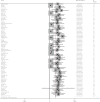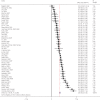Fear of COVID-19 and its association with mental health-related factors: systematic review and meta-analysis
- PMID: 35307051
- PMCID: PMC8943231
- DOI: 10.1192/bjo.2022.26
Fear of COVID-19 and its association with mental health-related factors: systematic review and meta-analysis
Abstract
Background: The severity of COVID-19 remains high worldwide. Therefore, millions of individuals are likely to suffer from fear of COVID-19 and related mental health factors.
Aims: The present systematic review and meta-analysis aimed to synthesize empirical evidence to understand fear of COVID-19 and its associations with mental health-related problems during this pandemic period.
Method: Relevant studies were searched for on five databases (Scopus, ProQuest, EMBASE, PubMed Central, and ISI Web of Knowledge), using relevant terms (COVID-19-related fear, anxiety, depression, mental health-related factors, mental well-being and sleep problems). All studies were included for analyses irrespective of their methodological quality, and the impact of quality on pooled effect size was examined by subgroup analysis.
Results: The meta-analysis pooled data from 91 studies comprising 88 320 participants (mean age 38.88 years; 60.66% females) from 36 countries. The pooled estimated mean of fear of COVID-19 was 13.11 (out of 35), using the Fear of COVID-19 Scale. The associations between fear of COVID-19 and mental health-related factors were mostly moderate (Fisher's z = 0.56 for mental health-related factors; 0.54 for anxiety; 0.42 for stress; 0.40 for depression; 0.29 for sleep problems and -0.24 for mental well-being). Methodological quality did not affect these associations.
Conclusions: Fear of COVID-19 has associations with various mental health-related factors. Therefore, programmes for reducing fear of COVID-19 and improving mental health are needed.
Keywords: COVID-19; anxiety disorders; depressive disorders; fear; sleep disorders.
Conflict of interest statement
None.
Figures


























References
-
- World Health Organization. Coronavirus Disease (COVID-19) Pandemic. World Health Organization, 2021. (https://www.who.int/emergencies/diseases/novel-coronavirus-2019).
-
- Ritchie H, Mathieu E, Rodés-Guirao L, Appel C, Giattino C, Ortiz-Ospina E, et al. Coronavirus Pandemic (COVID-19). Our World in Data, 2020. (https://ourworldindata.org/coronavirus).
Publication types
LinkOut - more resources
Full Text Sources

